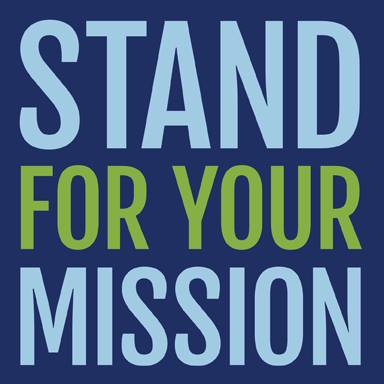Whether it’s promoting health care and education to transform the lives of children and families, expanding access to the arts in communities, or protecting natural resources — our philanthropic goals are driven by a purpose. We do what we do because we believe that some things are important enough for us to take a stand.
Each of us has made a personal commitment to serve. We do it because it calls upon the better part of ourselves. The part that believes we must try. That believes that when we do try, we can make a difference, even in a world full of tough challenges: resource limitations, differing opinions, and conflicting priorities.
It is a fact of life that decisions get made every day that have a profound impact on our work, investments, and ability to meet our strategic goals. When the issues we care about aren’t represented at the policymaking table, we are forced to pick up the pieces — and often asked to foot the bill after flawed decisions are made.
Our communities deserve better.
The fact is that our respective philanthropic goals will never be met if we are relegated to accepting decisions about public policies that are made without us or the voices of our grantees. We can address the root causes of social problems by influencing policymakers and the public to achieve real impact and leverage our resources — but only if we find our voice.
The most successful foundations have recognized that finding our voice does not require stepping into the quagmire of partisan politics. It simply means using our voices as committed and informed champions for our missions. We are creating real impact by responding to community needs, calling attention to urgent issues, bringing people together, looking for transformative solutions, partnering with nonprofits, and sharing our knowledge to improve public policy.
When it comes to advancing our important missions and goals, one of the most useful assets that we have available to us is something that is woefully underutilized: our voice.


We have an opportunity to be mission champions.
Our perspective matters, as does our willingness to stand up for what’s most important to our missions, our communities, and our grantees.
As foundation leaders — board and staff alike — we have the opportunity to serve as powerful champions for our missions. We have the opportunity to partner with our grantees to amplify each other’s voices and make good things happen.
It is time for us to find our voice as a social sector. It is time for us to unleash our full potential to make the world a better place. It is time for us to stand for our missions.
Board Advocacy in Action
Baptist Healing Trust, Nashville, TN: A board-driven strategy to embrace advocacy
With a focus on extending compassionate health care to vulnerable populations in Tennessee, the Trust’s grantees were running into policy roadblocks at every turn. Progress was only going to be made with system change at the state level, and the grantees needed the Trust’s help. As the board members grappled with what their path forward should be, they reached out to other foundations that were investing in advocacy as a strategy for greater impact. They learned from their peers that many characterized their foundation’s investments in advocacy as the most important work that they do to further their foundation’s mission. These insights and perspectives bolstered the resolve of the Trust’s board, and led to an intentional, purposeful journey that ultimately resulted in the Trust adding strategic advocacy to its core mission statement and devoting a third of the Trust’s portfolio to supporting advocacy.
Potential Advocacy Roles for Foundations
We have examples of the various ways your foundation can engage or support systems change through advocacy. All of the roles are permissible activities for private and community foundations, and could be integrated into the everyday work of your foundation.
Funder
Fund advocacy and legal lobbying activities and coordinate with other funders.
Champion
Internally and externally, be a loud and frequent voice for the policy work of grantees.
Scout
Keep your eyes and ears open to discussions on the opportunities, barriers, and solutions relevant to a specific policy issue.
Convener
Bring government, nonprofit, foundation, and business to a common table to address issues of importance.
Educator
Raise awareness of policy matters with the general public, media, and policymakers.
Capacity Builder
Provide advocacy training for foundation staff, foundation board members, and grantees.
Researcher
Publish reports that educate policymakers, general public, and media on specific policy issues.
Defender
Engage with and support groups that work to protect the interests of all nonprofits.
Partner
Join coalitions that are working towards systems change at the local, state, and federal levels
Download the full discussion guide to continue the conversation with your board and grantees.


